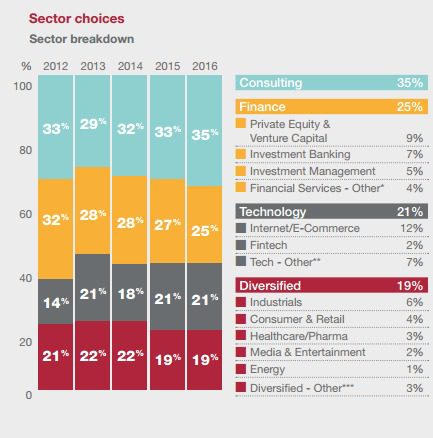How An MBA Degree Can Land You a Job at Pfizer

MBA grads looking to make headway in an ever-expanding field with massive growth potential should look no further than healthcare and pharmaceuticals. There’s a reason more and more business school graduates have begun to pursue pharma over more tried-and-true post-MBA paths like real estate, consulting, and finance: the pharma industry offers a myriad of opportunities. There’s an almost inexhaustible supply of interesting problems to solve while earning boast-worthy salaries.
When it comes to major industry players, Pfizer is one of the undisputed global pharmaceutical leaders. Many of its products have burrowed their way into popular consciousness—both figuratively and literally. Lipitor, Viagra, Zoloft, Xanax, Advil, ChapStick, Preparation H, and Robitussin are iconic brands unto themselves.
Below, we’ll take a deeper look into exactly how MBAs can gain a foothold at Pfizer.
Why Do MBAs Love Pfizer?
Pfizer’s name brand recognition just so happens to correlate with a stellar internal reputation among employees, both past and present. Forbes, Fortune, LinkedIn, CareerBliss all consistently rank Pfizer as one of the happiest, most employee-centric, and/or most in-demand employers in the American pharma space.
In an interview with the Stevens Institute of Technology blog, Pfizer Senior QA Manager Bill Mestrandrea, a Stevens MBA alum, spoke of the deep camaraderie that he has with his fellow MBAs at Pfizer, comparing it to a “band of brothers.”
He elaborates: “We’re all in it together. I’ve met people from other departments who my work influences, and they’ve influenced my work as well. It gave me a better understanding of the network within Pfizer, and how it all comes together to form one company, always working in support of our patients.”
An anonymous former Pfizer employee took to Glassdoor to extol the company’s virtues: “If you can keep up with the fast pace and are not overly sensitive, Pfizer is a great to work. Everyday is an adventure and the benefits are excellent.” An anonymous Technical Specialist in the New York branch lauded Pfizer’s “great gym, clinic, cafeteria, and day care” in a Forbes profile.
Payscale reports that MBAs earn an average starting salary of around $121,000. Pfizer prides itself on a competitive compensation and benefits package that rewards employees “based on the contributions they make to [the] business.”
The company offers a number of in-house health and wellness programs, including health and disability insurance, medical screening, free or reduced-cost vaccinations, discounts on Pfizer products, and nutrition and fitness counseling. As part of the benefits package, Pfizer also offers access to colleague-directed retirement funds, company contributions to retirement financial vehicles, life insurance, and financial planning education.
Working at Pfizer
If there’s a common thread that runs through day-to-day life for all MBA grads at Pfizer, no matter their function, it’s that they’re all expected to move quickly and keep up with the constant demand. Pfizer is sympathetic and has sought out solutions to help acclimate first-year MBAs—namely, its Summer Associate Program, which has placed alum in full-time roles for the past 15 years.
Pfizer’s 10-12 week Summer Associate Program recruits and provides “first-year MBA students from top-ranked business schools … with a variety of unique experiences that will serve to develop and broaden critical skill sets and competencies as they progress their development towards leadership roles within Pfizer.”
Students are assigned challenging projects within Consumer Marketing, Corporate Audit, Corporate Finance, Global Procurement, Pfizer Consulting & Execution, and Pharmaceutical Marketing. By the end, Summer Associates “gain a wealth of valuable industry knowledge, networking opportunities, and life experiences.”
According to Pfizer, “MBA Summer Associates receive an industry competitive salary, housing support options and the prospect of conversion to a full-time opportunity upon the completion of their MBA degree.”
Jane Scholl (Columbia Business School ’12), whose healthcare resume stemmed from a desire to “improve the lives of others,” discussed the way her 2012 internship led to a position with the Marketing Rotational Program the following year:
“Though I only spent three months with Pfizer during the summer, I was treated as a valued member of the team rather than an intern. I was encouraged to share my thoughts and ideas even if they differed from those of other colleagues. I worked on meaningful projects that contributed to the business, and some of my recommendations were implemented before the end of the summer.”
Oindrila Sardar (Chicago Booth ’11), a Senior Manager at Pfizer’s Established Products Marketing Platform, discussed the relationship she had with the rotation managers during her Summer Associate internship:
“My rotation managers have played a critical role in my development with weekly one-on-one meetings and their insightful project guidance. They have been receptive to my interests and have matched them with meaningful assignments Throughout my rotations I have worked with cross-functional colleagues from many areas of the company which has helped me further understand Pfizer and its structure. I have been surprised by the high level of trust and responsibility given from the very beginning.”
Landing a Job at Pfizer
It’s pretty straightforward: Pfizer’s Summer Associate Internship is a surefire way for MBAs to get hired. In fact, 16 out of its recent 25 summer associates were extended full-time offers. That said, there’s plenty of recruitment that takes place outside the sacred intern space.
In the fall, Pfizer aggressively targets top MBA programs, particularly in the Mid-Atlantic and Northeast close to its New York HQ. The company is interested in drawing from a pool of diverse and competitive first-year applicants, especially those with a taste for finance, marketing, global supply, and general management. Although previous pharma experience will make your application more competitive, Pfizer is equally interested in applicants with compelling reasons for a career change.
Interviews begin in January and run until March. Pfizer sometimes conducts group interview sessions in which four or five applicants discuss issues with staff members. This process is designed to understand which folks will make a meaningful contribution to a Pfizer culture with many distinct and occasionally contentious points-of-view.
Fordham Gabelli’s Checks In With Its Veterans in Global Leadership Fellows

The Gabelli School of Business at Fordham University recently highlighted a group of military veterans currently part of the school’s Veterans in Global Leadership (VGL) fellows program.
VGL was founded by Jayson Browder, a Fulbright scholar and a U.S. Presidential Management Fellow at the White House. Browder, PCS ’13, founded VGL with the intention to help “student veterans prepare and apply for prestigious internships, fellowships, and scholarships.”
Browder explains how a VGL program might make the difficult transition to civilian life a little more manageable for veterans: “[Vets] have implemented foreign policy abroad and have been tasked with solving complex problems. Now that they are back from the longest wars in our nation’s history, they’re looking to solve more problems and create an impact in their communities here in the states and abroad.”
After a 20-year stint in the Marines, VGL fellow Coleen Harper opted to major in nonprofit leadership at Gabelli. She founded D’ St. Aubyn’s Cause, which seeks to “diminish the rate at which veterans, single parents, and the elderly fall victim to homelessness.” Harper explains her motivation, saying, “My fears of becoming homeless were ignited as I proceeded through the process of retirement. This propelled me to make a difference rather than becoming a part of the problem. “A program like VGL can certainly help make an achievement more attainable.”
VGL fellow Robert Molina was an aviation logistics clerk in the Marines who now serves as communications chief of the Fordham Veterans’ Association as he completes a degree in political science and economics.
Fordham Veterans’ Association President Kevin Knightes arrived having previously served with that Hospital Corpsman Pharmacy Technician with the U.S. Navy for four years. He is now working toward an bachelor’s in Middle East Studies with minors in Arabic and Philosophy.
Of the VGL fellowship, Knightes writes, “I found that VGL aligned with my goal to continue service, but it will also introduce me to a vast network of like-minded people to share resources with.”
Top MBA Recruiters: Finding A Role With PepsiCo

PepsiCo is one of the most well-known companies in the world. Known as a top manufacturer, marketer, and distributor of soft drinks and snack foods, the company also serves as a top recruiter of MBA talent in the United States. Continue reading…
Careers After School: Chicago Booth

At the University of Chicago Booth School of Business, 90.7 percent of 2016 MBA students had a job offer at graduation; 98.4 percent had a job offer by three months post graduation. And it’s no surprise. Not only is the Booth School ranked as one of the top names in MBA education by Bloomberg, U.S News, Financial Times, and The Economist, but as a university, it places a high emphasis on career services. Continue reading…
How Wharton Prepares MBA Graduates For The Workforce

Going back to business school to pursue an MBA is an important step to getting that high-paying dream job. However, the path to graduation and employment can be a little overwhelming for some. In order help students out and ultimately increase their likelihood of being hired post-grad, schools prepare their students for various careers and industries through internship programs, career services and counseling, hands-on projects and sprawling alumni networks.
LBS Employment Report Finds Grads Falling Out Of Love With Finance

London Business School MBA graduates may be seeing higher salaries and increased hiring rates, but its love of the finance industry may be waning.
According to the 2016 London Business School employment report, MBA grads are joining the financial sector at the lowest rate in five years. LBS grads are still joining the industry at 25 percent overall, which trails the 35 percent of graduates that enter consulting. Technology, which hired the third-most LBS 2016 graduates, came in third at 21 percent—the same percentage from the previous year.

via London Business School Employment Report 2016
Goldman Sachs, which typically hires the most LBS MBAs that move into the financial sector, only hired six employees from the 2016 class, down from nine the previous year. Credit Suisse and Citi Bank also hired less grads than the previous year. This all comes despite the fact that the aforementioned companies hired several more total summer interns, but did not retain them. For instance, Goldman Sachs took in 13 interns but only hired six employees—creating a retainment rate of only 46 percent.
Another marked difference is the slightly noticeable decline in finance hires joining private equity firms rather than traditional investment banks. 2016 marked the first year—ever—that more joined private firms, with nine percent of graduates compared to seven percent joining investment banking. These figures fall in line with trends that have persisted since the financial collapse of 2008. eFinancialCareers debuted a report in September of 2016 that found a steadily declining love between MBAs and traditional big banking.
If you’re in London in particular, therefore, the MBA-into-banking route has pretty much disappeared in 2016. Banks’ recruiters say it’s the culmination of a long term trend. ‘This has been going on since 2008,’ says one, speaking off the record. ‘Once things got tough, MBAs just weren’t seen as value for money any more.’
Despite the dampening of the overall numbers, salary rates saw a noticeable bump for finance industry hires. The average annual salary of 2016 grads jumped from £78,358 to £81,905, with the highest max salary leaping from £125,468 to £151,469.
Consulting Hires Jump
The total percentage of LBS graduates joining the consulting industry jumped moderately from 33 percent in 2015 to 35 percent last year, with the majority of hires joining Boston Consulting Group (BCG), McKinsey & Co. and Bain & Company. BCG specifically saw hires nearly double over the course of a year, improving from 19 to 34 total.
Like the financial sector LBS hires, salaries increased across the board for consulting industry MBAs. The average annual salary of those in the industry leaped from £79,773 to £83,268, although the highest salary tracked was £117,389—down from £121,824 in 2015.
The Incoming LBS MBA Class
A total of 411 new students will join LBS in 2017, ranging from 24 to 39 years of age. They enter the MBA program with an average of five years of professional work experience and a 701 GMAT score (up from 699 last year). As well, there is a moderate increase in female students and diversified nationalities. Accepted female applicants jumped to 37 percent from 36 percent, and 68 total nationalities are represented, up from 65 in 2015.
You can read the entire LBS 2016 employment report here.
